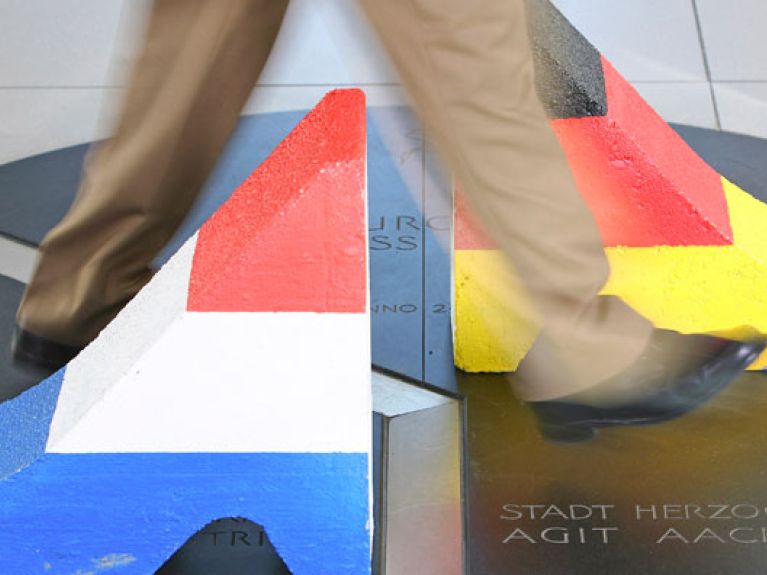German-Dutch proximity
A difficult history, related languages, life in modern Europe – people from Germany and the Netherlands have many things in common.

In the run-up to the German-Netherlands Forum in Berlin, “border-crossers” from the two countries present their view of the neighbours’ relationship.
Monique van Daalen is the Ambassador of the Netherlands in Germany

“When it comes to the maintenance of our German-Dutch relations, we can affirm that political, economic and cultural cooperation is now taking place at a high level. This is not only demonstrated by annual German-Netherlands intergovernmental consultations or our appearance as Guest of Honour at the Frankfurt Book Fair, but also by close collaboration in the defence sector. Thus, for example, German and Dutch soldiers are working together in Mali, northern Afghanistan and Iraq. In the meantime this cooperation is considered a blueprint for many other European alliance partners.
It is clear that the Netherlands and Germany have a great deal in common, and against this background we can optimistically look forward to further cooperation. These are times, however, in which European cooperation is needed more than ever. That is the only way we can confront cross-border challenges, such as the refugee crisis and terrorism. Dialogue, a willingness to compromise and mutual understanding are urgently needed. The Netherlands actively worked for this during its Presidency of the Council of the European Union in the first half of 2016 and will continue to do so in the future – together with like-minded partners such as Germany.”
Dutchman Johan Simons has been Artistic Director of the Ruhrtriennale since 2015. Before that he was in charge of the Münchner Kammerspiele.

“When I think about what links the Netherlands and Germany, then, of course, I immediately think of their geographical proximity. We are neighbours and, as is always the case between neighbours, we have understood one another sometimes well and sometimes not so well. We are also close in terms of language. As a director I see a strong relationship between the Netherlands and Germany that reveals itself in the theatre culture of both countries. Dutch and German actors share a special ability – for abstract theatre. They are interested in concepts and do not limit themselves to naturalistic drama. Artistically, I consider that one of the most important connections between the two countries.”
Janet Antonissen teaches intercultural communication at the International Business School in Venlo and advises companies in Germany.

“What unites Germany and the Netherlands? What do they have in common? A great deal, actually. They enjoy working together, they simply understand each other. When both sides are communicating directly, it leaves little, if any, room for misunderstandings. Goals might be reached in a different manner, but creativity and thoroughness complement each other well. With a large portion of cosmopolitan attitudes both in the business and private areas of their lives (both nationalities love travelling, even to the most remote corners of the world) nothing stands in the way of a Dutch-German friendship. And love? According to Dik Linthout, nowhere else in Europe are there so many relationships, so many cross-border marriages or co-habiting couples. If that is not a uniting factor, what is?”
Thomas Hoeps from Germany and Jac Toes from the Netherlands write crime novels together.

“Every country maintains the tradition of having at least slightly negative stereotypes about its neighbouring countries. For a long time that was no different between Germany and the Netherlands. However, Dutch people’s image of the ‘botten’ – in other words, the rather unfriendly and rude German ‘beach section occupier’ – has significantly changed for the better in the last decade. People now appreciate the respectful and trustworthy German who is quality conscious. In the other direction, the German image of the rather too casual, constantly improvising Dutchman has become a lot more realistic in the wake of the economic crisis and the debates about migration. Beyond the black-and-white thinking, it has become easier for us to appraise and accept the good characteristics of the other. And at least wiser German-Dutch thinkers seem united in the belief that German-Dutch friendship can and must form a decisive basis for a more positive development of Europe.”
